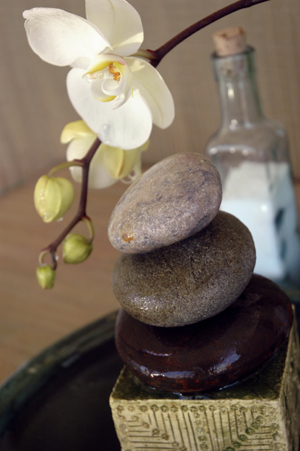
Feng shui has been refined over thousands of years. It has evolved into a systemized art and science and has now been organized into various schools, each having a specific set of guidelines.
by Joy Abrams —
Feng shui is an ancient Chinese art that involves science in the practice of placement. Its literal translation is wind and water, but its definition includes the analysis of environments for and locating sites that have a favorable life energy called chi. Feng shui also is used to make adjustments to the preexisting chi in a building or home.
It is important to know that feng shui was developed thousands of years ago by rural people whose survival depended on choosing land with good accumulated chi, not malignant chi which is known as sha chi. Good sites were defined as land that was fertile and provided safety; bad sites by land that proved uncooperative and therefore dangerous to its inhabitants. Winds, rivers, topography and cardinal directions were carefully analyzed by the ancient Chinese to discern the best places for them to live and work.
Today, as much of the Chinese population is crowding into cities like Hong Kong and Taipei, feng shui principles are applied there to enhance urban and interior spaces. No major building project is even considered without having the feng shui of the area, property and building assessed. People who live in environments with good chi feel more energetic, creative and balanced. These conditions increase the potential for social and financial success, as well as harmony.
For example, the owners of the Hong Kong and Shanghai banks demanded that feng shui be applied in the design of their massive skyscraper headquarters. The feng shui masters they consulted influenced everything from the placement of the furniture to the lobby’s escalators and doors. They even provided input on exposed structural systems like heating ducts and wiring. Feng shui principles are also used by Chinese businesses to gain what they believe to be a financial edge over their corporate rivals, such as Coca Cola, McKinney & Co. and other Wall Street firms.
Feng shui has been refined over thousands of years. It has evolved into a systemized art and science and has now been organized into various schools, each having a specific set of guidelines. The feng shui master is knowledgeable about all the guidelines and is able to apply them according to a client’s specific needs. Feng shui is not just about place, but also incorporates the way one resonates in that place. The feng shui master must carefully consider how the chi behaves in each situation.
Today when feng shui is applied to a home or business, many different features are taken into consideration. These include positioning and shapes of buildings, roofs, chimneys, drains, beams, columns, windows, doors and lights. Although the goal of feng shui is the creation and enhancement of good chi, it also is used to recognize, avoid and correct existing conditions with excess malignant chi.
While feng shui theories are grounded in ancient Chinese philosophy, the principles of good chi are universal. Collectively they present an effective tool for design as well as environmental analysis in our modern world.
Joy Abrams, M.A., FSII, is an international author and feng shui master, yoga master and empowerment specialist. She provides feng shui consultations for corporations and homeowners. www.aaafengshuiandyoga.com or 602-791-5223.
Reprinted from AzNetNews, Volume 26, Number 5, October/November 2007..





August 22, 2012
Environment, Feng shui, Philosophical